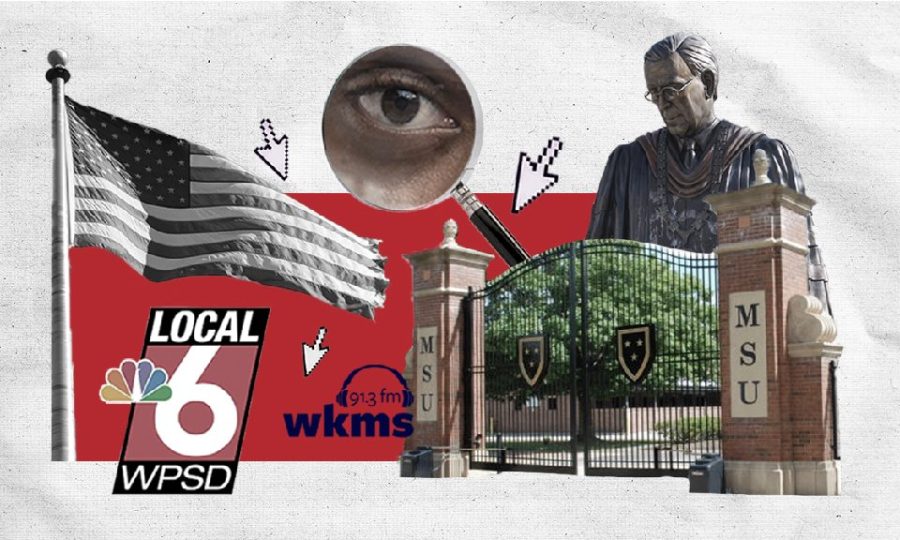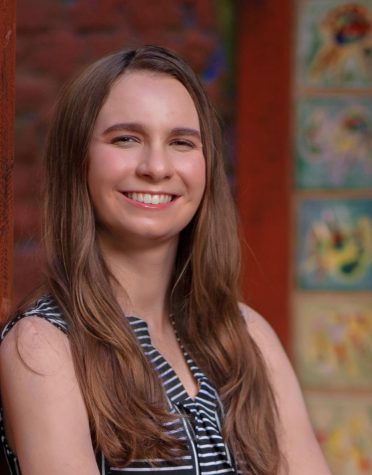Admin denies open records request
University cites freedom of the press as reason for open records refusal
Shann Riley/The News WPSD requested the email correspondence between multiple University parties in regards to former Judge Jamie Jameson contacting admin discussing a WKMS story. (Shann Riley/The News
December 1, 2022
The University denied an open records request from the WPSD Local 6 news station in Paducah seeking communication between University administration, WKMS and former 42nd Judicial Circuit Judge Jamie Jameson, citing the First Amendment and the request being “burdensome.”
WKMS, Murray State’s public radio station, previously filed an open records request for video footage of Jameson roaming the Marshall County Judicial Building in his underwear.
When Jameson discovered the request, he contacted former WKMS Station Manager Chad Lampe. According to allegations from the state Judicial Conduct Commission(JCC), Jameson pressured Lampe to abandon the story by claiming he had contacted University administration and President Bob Jackson disapproved of its publication.
On Oct. 7, the JCC found Jameson attempted to use his position as a judge to stop WKMS from pursuing the story. They removed Jameson following a series of hearings in early November.
Lampe provided testimony on the matter during one of Jameson’s hearings in October. Both Lampe and Jameson testified the judge inquired about the request to Jackson.
WPSD then filed a request in an attempt to learn about Jackson’s alleged involvement in preventing the story from airing. In the denial letter, General Counsel Robert Miller stated the request was unreasonable and hindered WKMS journalists from exercising their First Amendment right to freedom of the press.
“Permitting the public to engage in fishing expeditions by searching the files of journalists…undermines and dissuades the press from fulfilling its Constitutionally protected freedom,” the letter read
Perry Boxx, news director of WPSD, disagreed with the response and said the request is not a First Amendment issue.
“What’s being questioned is the sanctions taken by the administration there, Dr. Jackson, and the reaction to it, the fallout from it,” Boxx said. “It has nothing to do with knowing the inner workings of the journalists.”
Following the denial, WPSD sent an additional request on Nov. 16 clarifying the term “records” includes all documents, regardless of medium, in the University’s possession as established by Kentucky statutes. The University also denied the second request.
Senior journalism major Dustin Wilcox said he was upset by the University’s decision.
“I did not feel that the request was unreasonable in its scope, nor did I think it was within the University’s jurisdiction to say no to such a request,” Wilcox said. “I feel that the ability to complete quality journalism was impeded that day.”
Wilcox said WPSD’s request would have benefited their journalistic endeavors if accepted.
“It’s not every day that WPSD gets to cover such an intriguing story, so to have the University say no to that is incredibly disconcerting for me,” Wilcox said. “As a student journalist, I have routinely run into roadblocks when trying to seek even the most innocuous information from Murray State administration, so it doesn’t surprise me that admin would say no to something more serious.”
The request denial caught the attention of the Kentucky Open Government Coalition, a Hopkinsville-based nonprofit organization that seeks to protect the accountability of the state government.
“The First Amendment erects no barrier to public information,” the Coalition wrote in an online post. “It is not a federal law or regulation that prohibits disclosure of public records. Murray State’s argument is a textual non-starter and, frankly, deeply offensive.”
Miller also added in the letter the request would require an “unduly burdensome” search through prior emails.
“Such a review would require dozens, and perhaps hundreds, of hours to search, locate, review and redact—as may be necessary—depending on the number of emails such a search would produce,” Miller said.
Miller said it is common for the University to receive over 100 open records requests every year.
“The University responds to each request thoroughly, promptly and courteously,” Miller said. “University responses to these requests are rarely appealed, and the University strives to work with requesters whenever possible.”
Shawn Touney, executive director of Marketing and Communication, noted that current and former WKMS staff members have testified under oath they willingly discontinued the story.
“Importantly, we stand behind WKMS news reports and former WKMS Station Manager Chad Lampe’s prior statement that Jameson’s explanation to Lampe made sense,” Touney said. “The story was not newsworthy and that he was not pressured about the story.”
Touney noted these statements are consistent with Lampe’s testimony to the JCC. He also said Jackson was unaware of the story at the time and stated such to Jameson.
“Dr. Jackson informed General Counsel Rob Miller and Provost Tim Todd of this call,” Touney said. “President Jackson asked the provost to keep General Counsel Miller informed and took no further action… The University will have no further comment on this matter.”
WPSD appealed the denial of the request. Louisville attorney Michael Abate, representing WPSD, said the University’s claim the First Amendment protects WKMS correspondence is false.
“MSU is simultaneously claiming that Mr. Boxx has not identified a specific date range and individuals in his request and that producing records responsive to the specific date and individuals identified in the request is unduly burdensome,” the appeal read. “MSU cannot have it both ways.”
On Nov. 16, WPSD approached Jackson with questions about his alleged involvement while he was in Paducah for a Rotary Club meeting. After declining to answer the questions, Jackson entered the backseat of a car and departed.
WPSD is currently awaiting the result of the appeal.
achuppe@murraystate.edu





























































































